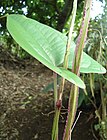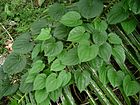Note: This is a project under development. The articles on this wiki are just being initiated and broadly incomplete. You can Help creating new pages.
Difference between revisions of "Dioscorea alata"
(→Uses) |
|||
| Line 2: | Line 2: | ||
'''Dioscorea alata''' is a perennial, climbing plant. It produces annual stems up to 15 metres long from a very large tuberous rootstock. These stems scramble over the ground, or twine into the surrounding vegetation. The stem is quadrangular, winged, and twines right-handed. | '''Dioscorea alata''' is a perennial, climbing plant. It produces annual stems up to 15 metres long from a very large tuberous rootstock. These stems scramble over the ground, or twine into the surrounding vegetation. The stem is quadrangular, winged, and twines right-handed. | ||
==Uses== | ==Uses== | ||
| − | {{Uses|}}, {{Uses|}}, {{Uses|}}, {{Uses|}}, {{Uses|}}, {{Uses|}}, {{Uses|}}, {{Uses|}}, {{Uses|}}, {{Uses|}}, {{Uses|}}. | + | {{Uses|}}, {{Uses|}}, {{Uses|}}, {{Uses|}}, {{Uses|}}, {{Uses|}}, {{Uses|}}, {{Uses|}}, {{Uses|}}, {{Uses|}}, {{Uses|}}. |
==Parts Used== | ==Parts Used== | ||
Revision as of 16:57, 27 April 2020
Dioscorea alata is a perennial, climbing plant. It produces annual stems up to 15 metres long from a very large tuberous rootstock. These stems scramble over the ground, or twine into the surrounding vegetation. The stem is quadrangular, winged, and twines right-handed.
Contents
- 1 Uses
- 2 Parts Used
- 3 Chemical Composition
- 4 Common names
- 5 Properties
- 6 Habit
- 7 Identification
- 8 List of Ayurvedic medicine in which the herb is used
- 9 Where to get the saplings
- 10 Mode of Propagation
- 11 How to plant/cultivate
- 12 Commonly seen growing in areas
- 13 Photo Gallery
- 14 References
- 15 External Links
Uses
[[:Category:Ayurvedic Herbs known to be helpful to treat |]], [[:Category:Ayurvedic Herbs known to be helpful to treat |]], [[:Category:Ayurvedic Herbs known to be helpful to treat |]], [[:Category:Ayurvedic Herbs known to be helpful to treat |]], [[:Category:Ayurvedic Herbs known to be helpful to treat |]], [[:Category:Ayurvedic Herbs known to be helpful to treat |]], [[:Category:Ayurvedic Herbs known to be helpful to treat |]], [[:Category:Ayurvedic Herbs known to be helpful to treat |]], [[:Category:Ayurvedic Herbs known to be helpful to treat |]], [[:Category:Ayurvedic Herbs known to be helpful to treat |]], [[:Category:Ayurvedic Herbs known to be helpful to treat |]].
Parts Used
Root.
Chemical Composition
Common names
| Language | Common name |
|---|---|
| Kannada | |
| Hindi | |
| Malayalam | |
| Tamil | |
| Telugu | |
| Marathi | |
| Gujarathi | |
| Punjabi | |
| Kashmiri | |
| Sanskrit | |
| English |
Properties
Reference: Dravya - Substance, Rasa - Taste, Guna - Qualities, Veerya - Potency, Vipaka - Post-digesion effect, Karma - Pharmacological activity, Prabhava - Therepeutics.
Dravya
Rasa
Guna
Veerya
Vipaka
Karma
Prabhava
Habit
Identification
Leaf
| Kind | Shape | Feature |
|---|---|---|
Flower
| Type | Size | Color and composition | Stamen | More information |
|---|---|---|---|---|
| {{{5}}} |
Fruit
| Type | Size | Mass | Appearance | Seeds | More information |
|---|---|---|---|---|---|
Other features
List of Ayurvedic medicine in which the herb is used
Where to get the saplings
Mode of Propagation
How to plant/cultivate
Plants grow best in lowland tropical areas up to an elevation of 1,000 metres with a temperature around 26 - 34°c.[3]
Commonly seen growing in areas
[[:Category:Herbs that are commonly seen in the region of |]], [[:Category:Herbs that are commonly seen in the region of |]], [[:Category:Herbs that are commonly seen in the region of |]], [[:Category:Herbs that are commonly seen in the region of |]], [[:Category:Herbs that are commonly seen in the region of |]].
Photo Gallery
References
- ↑ [Chemistry]
- ↑ [Morphology]
- ↑ Cultivation
External Links
- Dioscorea alata on cabi.org
- Dioscorea alata on missouribotanicalgarden.org
- [sciencedirect.com/topics/agricultural-and-biological-sciences/dioscorea-alata Dioscorea alata on sciencedirect.com]




